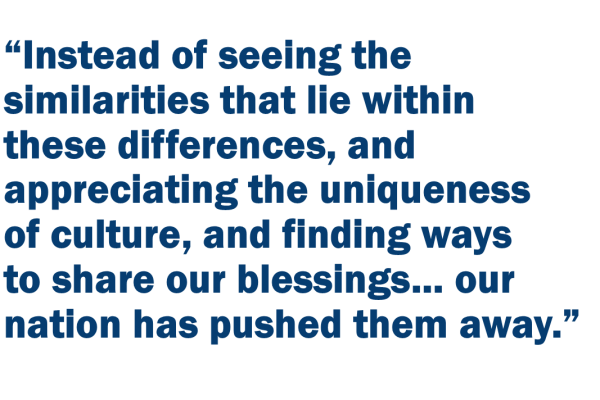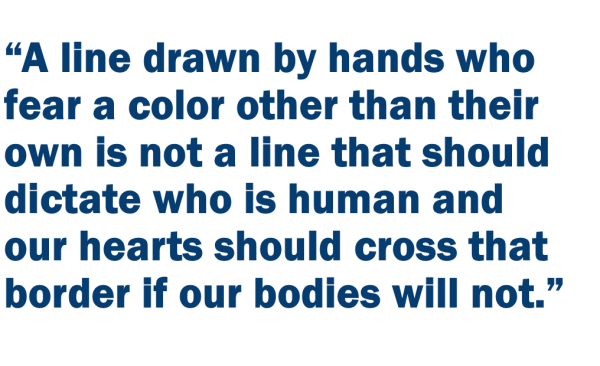PERSPECTIVE - Both Sides of the Wall: What Being in Mexico Taught Me
/by Skylar Haines She loves nonfiction books about animals. She has a group of friends. She laughs and cries. She does her homework and sometimes struggles with silent letters on spelling quizzes. She tucks her hair behind her ears when trying to concentrate. She watches TV before her chores are done.
He plays soccer in the streets and stays out past his mom's calls to come inside for dinner. He knows everything about music, but can't wrap his mind around grammar and sentence structure. He sneaks dessert before dinner. He has a math teacher who changed his life just by believing in him. He makes jokes and gets angry. He takes the long walk home on nice days. They could be my brother or sister. They could be the kid who sits next to you in class and shares their gum. They could be the neighbor that you drive by each morning. They could be a friend. They could be your child.
Yet, their streets look different than ours, with cracked sidewalks and stray dogs. Homes are turned into storefronts and host traditional embroidery, dulce de leche caramels, and cold grapefruit soda. People sit on the porch and call out to you as you make your way to the line of buses with people going to different jobs and different streets. No matter what street you're on, you'll see crucifixes and Virgin Mary portraits, food carts and hard-working owners, and strangers welcoming strangers with "Bienvenidos" and smiles.
Their schools look different than ours, with torn pages escaping their notebooks, desks missing a leg and chairs that sink too low, broken pencil stubs, and faded writing pressed into the old whiteboards. The bare courtyard has no toys and cracks all along the middle so they stumble while they run. The plaster of the walls peels slowly and teachers try to make do with a few pieces of colored paper and an eraser. Lunch stains are deep in the wrinkled uniform that hasn't been washed since the students started sleeping at the Salvation Army during the week, just so they could get to class consistently.
 Instead of seeing the similarities that lie within these differences, and appreciating the uniqueness of culture, and finding ways to share our blessings… our nation has pushed them away. They have become a "them", divided from our population out of fear of these differences and blindness to the multitudes of commonalities. If you could talk to Reyna about her dream of being a doctor and how much she loves learning new words, if you could talk to Munir about his favorite songs and how he tells jokes to make friends… then you would see the similarities we share, and yet how many differences they face. However, do not be mistaken, this doesn't stop them.
Instead of seeing the similarities that lie within these differences, and appreciating the uniqueness of culture, and finding ways to share our blessings… our nation has pushed them away. They have become a "them", divided from our population out of fear of these differences and blindness to the multitudes of commonalities. If you could talk to Reyna about her dream of being a doctor and how much she loves learning new words, if you could talk to Munir about his favorite songs and how he tells jokes to make friends… then you would see the similarities we share, and yet how many differences they face. However, do not be mistaken, this doesn't stop them.
On our last day at the Serapio School, a government school in the impoverished community, my Mother and I, volunteers teaching English, had to explain that we were leaving. Try explaining that to people who became familia in just one week. As I stumbled through a goodbye that day, Estefania, a fourth-grade student, reached into her Hello Kitty purse and placed something in my palm. A single confetti butterfly, smaller than a penny, that sparkled when it caught the sunlight. Holding that gift and looking at the school's empty concrete courtyard, the streets and people that occupy them, the faces of broken children sitting in disheveled desks- it was a piece of hope, and she knew that.
She didn't have to say a word at that moment, the butterfly was a tangible reminder of all they had taught me. They might remember a few English words or have held onto their pencils and eraser caps from the time I was there, but they taught me something I have held onto for much longer. The children I know find beauty in everything, despite the hardships they deal with each day, and every time I look at that butterfly I am reminded of their resiliency and resounding hope.
That's why I know they can do beautiful things. Being given so little- one ripped uniform, broken pencils without a sharpener, expo markers that have been dry for years- and still holding warmth for others and wonderful visions of a future through it all, cherishing the tiny butterflies in life, that is resiliency. I can only imagine what they could accomplish with just a little bit of support.
In fact, I know. My foundation, "Peace, Love and Art: Hope for the Children of the Serapio School in Mexico" provides creative therapies like art and musical instruments and classes for all the students where they express their culture, backgrounds, and dreams. We also raised money to install a computer lab which allows them to learn and grow. What I am most excited about though, is the letter exchange program.
This school year students from Hebron, Connecticut will be emailing with the students I taught in Serapio, Mexico. This cross-cultural understanding is vital in our world today, especially in younger generations, in order to ensure collaboration, empathy, and peace in our global community in the future. Also, children who have expanded worlds through travel, cultural research, and outreach have more perspective and a better insight into the world and our human interactions… I can truly attest to this. This emphasis on humanity as children reach over divisive boundaries that have been set for centuries, is more important now than ever.
Over 11.6 million Mexican immigrants live in the United States currently. Yet, national dialogue that fuels schismatic rhetoric isolates these people… the people I know, the children I taught, the faces that mean more to me than "Mexican" now. We see this dialogue leading directly to policy under the new administration - the administration that was elected while I was in a nation stereotyped and degraded throughout their campaign.
 If you could see them the way I see them, as hard-working individuals that will do anything to provide for their family (like many of us would do), as welcoming neighbors who will open their doors to anyone...and as people. Not Mexicans, not drug-traffickers, not prostitutes, not foreigners, not aliens, not "them"...humans, people, children. These 11.6 million US citizens have names, stories, hopes, and families. The 303, 916 people who were apprehended at the Mexican border in 2017 have names, stories, hopes, and families. As do we.
If you could see them the way I see them, as hard-working individuals that will do anything to provide for their family (like many of us would do), as welcoming neighbors who will open their doors to anyone...and as people. Not Mexicans, not drug-traffickers, not prostitutes, not foreigners, not aliens, not "them"...humans, people, children. These 11.6 million US citizens have names, stories, hopes, and families. The 303, 916 people who were apprehended at the Mexican border in 2017 have names, stories, hopes, and families. As do we.
A line drawn by hands who fear a color other than their own is not a line that should dictate who is human and our hearts should cross that border if our bodies will not. And whenever I see faces of children being torn away at the borders, people being turned away and unwelcome… I see the children I laughed with and learned with in Mexico. The same people who never isolated me for being an American, even on that Tuesday when the whole world woke up to a new president who had called the people I lived with "enemies", "criminals", "terrorists", and "rapists".
I only hope that in the future if we are ever faced with having to flee our nation, that Mexico will forgive us and not treat us with the same degradation and disdain. If we do not extend the decency of providing asylum and even treating them with respect and compassion, then they will never do the same for us. Or they might, because that is how they treat people in Mexico, no matter what. Their culture could teach us a thing or two.
When I share glimpses about my journey in Mexico, my experience of the culture, and all the people who touched me while there, I generally get asked one big question: "Are you afraid of the wall being built?!"
Well, here's my answer: the wall has been up for a long, long time. The real question is, when will we start breaking it down?
________________________________
Skylar Haines is a senior at RHAM High School in Hebron and the founder of “Peace, Love and Art: Hope for the Children of the Serapio School in Mexico”. She is an active volunteer and advocate for those who are often not given a voice or platform. Her work was recognized by the World Affairs Council of Connecticut, where she received the Global Engagement Award in 2018. She is also the director, reporter and writer of the program “Speaking Through Stories” on the Community Voice Channel in Bolton. Skylar hopes to pursue a career in broadcast journalism that will encourage open dialogue as well as share people’s unique stories and perspectives.































